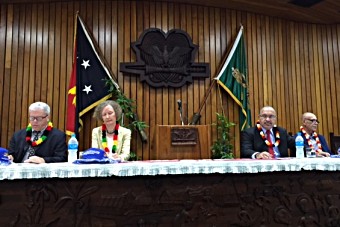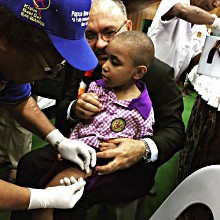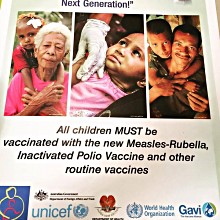
Official launch ceremony in PNG's Parliament building in Port Moresby. From left to right, Dr Pieter van Maaren, WHO Representative, Helen Evans, Special Representative of the Gavi CEO in the Asia-Pacific Region, Peter O'Neill, Prime Minister of Papua New Guinea and Michael Malabag, Minister of Health and HIV Aids.
Credit: GAVI/2015/Clio Van Cauter
Port Moresby, 12th August 2015 – In a landmark step to help accelerate the global eradication of polio and protect its children against measles and rubella, Papua New Guinea today introduced the inactivated polio vaccine (IPV) into its routine immunisation programme and launched a nationwide measles-rubella vaccine (MR) campaign.
Prime Minister Peter Charles Paire O’Neill attended an official launch ceremony in Port Moresby today to underline the Government’s commitment to immunisation – which is widely recognised as one of the most cost-effective and impactful public health interventions available
Recognising the importance of immunisation and its role as a platform for other health interventions, the National Department of Health, along with its development partners, is launching a Special Integrated Routine EPI Strengthening Program, called SIREP Plus, to introduce the two new vaccines and further strengthen routine immunisation in order to prevent disease and protect children’s health. The new vaccines will be targeted to reach children aged from 9 months to 15 years with the MR vaccine and children aged 3 to 12 months old for IPV.
Today’s introduction of IPV into Papua New Guinea’s routine immunisation schedule is part of a worldwide roll-out of the vaccine across 126 countries by the end of 2015 – the largest and fastest globally coordinated vaccine introduction project in history. It is funded as part of the budget of the Global Polio Eradication Initiative (GPEI), and support is channelled through Gavi, the Vaccine Alliance, WHO and UNICEF.

PNG’s PM Peter O'Neil and a child getting vaccinated at today’s polio and measles-rubella launch.
“The introduction of IPV is the result of significant progress for our country and the world against polio,” said Mr O’Neill, the Prime Minister of Papua New Guinea. “It means we are another step closer to ridding the world of this terrible disease, and we are on a path to provide the best possible protection against this virus to all.”
“By introducing the inactivated polio vaccine, Papua New Guinea is contributing to the global eradication effort of this crippling disease,” said Helen Evans, Special Representative of the Gavi CEO in the Asia-Pacific Region. “Polio remains a threat as long as there are cases anywhere in the world. By supporting IPV and helping countries strengthen their routine immunisation systems, Gavi is contributing to the tremendous partnership that aims to rid the world of this disease once and for all.”
The universal introduction of IPV is part of the Polio Eradication and Endgame Strategic Plan 2013-2018 to eradicate polio and secure the gains made against the disease through stronger immunisation systems, so that all children in all countries have access to vaccines. The plan also calls for the eventual removal of oral polio vaccination following the eradication of the remaining strains of poliovirus transmission, due to the very low risk of potential vaccine-associated cases. In 2014, 359 cases of polio were reported, while 34 have been recorded to date in 2015, down from more than 350,000 in 1988 when global polio eradication efforts began. The poliovirus is now only endemic in three countries worldwide: Afghanistan, Nigeria and Pakistan.
The introduction of IPV is the result of significant progress for our country and the world against polio.
Peter Charles Paire O’Neill, Prime Minister of Papua New Guinea
Oral polio vaccines (OPV) will continue to be used for all children under five. In addition to the new vaccines, other routine immunisations will be provided through SIREP Plus along with Vitamin A, which will be administered to children from 6–59 months of age, and deworming tablets for children.
“Despite this progress, experts caution that polio-free countries still remain at risk of re-infection until the disease has been eradicated everywhere. Adding IPV to OPV in routine immunisation schedules globally will usefully complement existing strategies to end polio,” emphasised Rotary’s International PolioPlus Chair Michael McGovern.
Alongside the introduction of IPV, Papua New Guinea today also launched a measles-rubella vaccination campaign for boys and girls aged 9 months-14 years. The introduction of this combined vaccine is an important step to protect the lives of children in Papua New Guinea against these two deadly and debilitating diseases.

Social mobilisation campaign for IPV and MR vaccine in Papua New Guinea.
“The introduction of IPV and MR vaccine is a vital step on the journey to securing a polio-free world and eliminating measles and rubella for all future generations to come,” added Dr. Pieter Johannes M. Van Maaren, WHO Representative to Papua New Guinea.
Although Papua New Guinea had reported no confirmed measles cases for several years, the country experienced a nationwide outbreak of measles with more than 2,600 confirmed cases reported since late 2013 with ongoing transmission through April 2015. Papua New Guinea is one of only three countries in the Western Pacific Region of WHO that had not already included measles-rubella vaccine in its routine immunisation schedule. By 2016, all countries in the region are expected to have introduced rubella vaccine, which is an important milestone in the regional elimination programme.
Impressive global gains have been made in the fight against measles in recent years and an estimated 15.6 million deaths were prevented through vaccination during 2000-2013. However progress have stalled and measles is still one of the leading causes of death among children worldwide. Measles is a highly contagious disease that claimed nearly 150,000 lives in 2013, of which 95% were in developing countries.
The MR vaccine also protects girls and future mothers against rubella, which affects over 100,000 children each year worldwide and leads to them being born with malformations and disabilities due to Congenital Rubella Syndrome (CRS) - 80% of these children live in Gavi-supported countries
Immunisation is one of the cheapest and most effective public health intervention for any country.
Mr. Baba Danbappa, UNICEF Representative to Papua New Guinea
“Renewed high level political commitment to tackling rubella and measles is needed otherwise countries will face both recurring, deadly measles outbreaks and the grave consequences of women being infected by rubella early on in their pregnancies,” added Mrs Evans. “Gavi, and its partners, including the Measles & Rubella Initiative are working to raise awareness of the importance of very high and sustained coverage for measles and rubella vaccine both through campaigns and via routine immunisation.”
UNICEF Representative to Papua New Guinea, Mr. Baba Danbappa added “Immunisation is one of the cheapest and most effective public health intervention for any country. In addition, the introduction of IPV and MR is an opportunity for the Government to invest more in immunisation for the future of Papua New Guinea. More resources are needed for the replacement of old immunisation infrastructures, improving the quality by building the capacity of the frontline health workers and providing effective information to our communities and families.”
For further information, please contact
- Clio Van Cauter, Gavi, The Vaccine Alliance, ccauter@gavi.org, +41 (79) 514 68 39
- Steven Busin, Communication Officer, WHO, busins@wpro.who.int; tel: 3257827
- Cifora Monier, Communication Specialist. UNICEF, cmonier@unicef.org +675 7031 6366
- Mr. Gerard Sui, National EPI Manager, National Department of Health; tel: 70998446
Gavi, the Vaccine Alliance is funded by governments (Australia, Brazil, Canada, Denmark, France, Germany, India, Ireland, Italy, Japan, the Kingdom of Saudi Arabia, Luxembourg, the Netherlands, Norway, the People’s Republic of China, Republic of Korea, Russia, South Africa, Spain, the State of Qatar, the Sultanate of Oman, Sweden, United Kingdom, and United States), the European Commission, Alwaleed Philanthropies, the OPEC Fund for International Development (OFID), the Bill & Melinda Gates Foundation, His Highness Sheikh Mohamed bin Zayed Al Nahyan and Majid Al Futtaim, as well as private and corporate partners (Absolute Return for Kids, Anglo American plc., the A&A Foundation, The Children’s Investment Fund Foundation, Comic Relief, the ELMA Vaccines and Immunization Foundation, The International Federation of Pharmaceutical Wholesalers (IFPW), the Gulf Youth Alliance, JP Morgan, “la Caixa” Foundation, LDS Charities, Lions Clubs International Foundation, UPS and Vodafone.
Click to view the full donor list.
